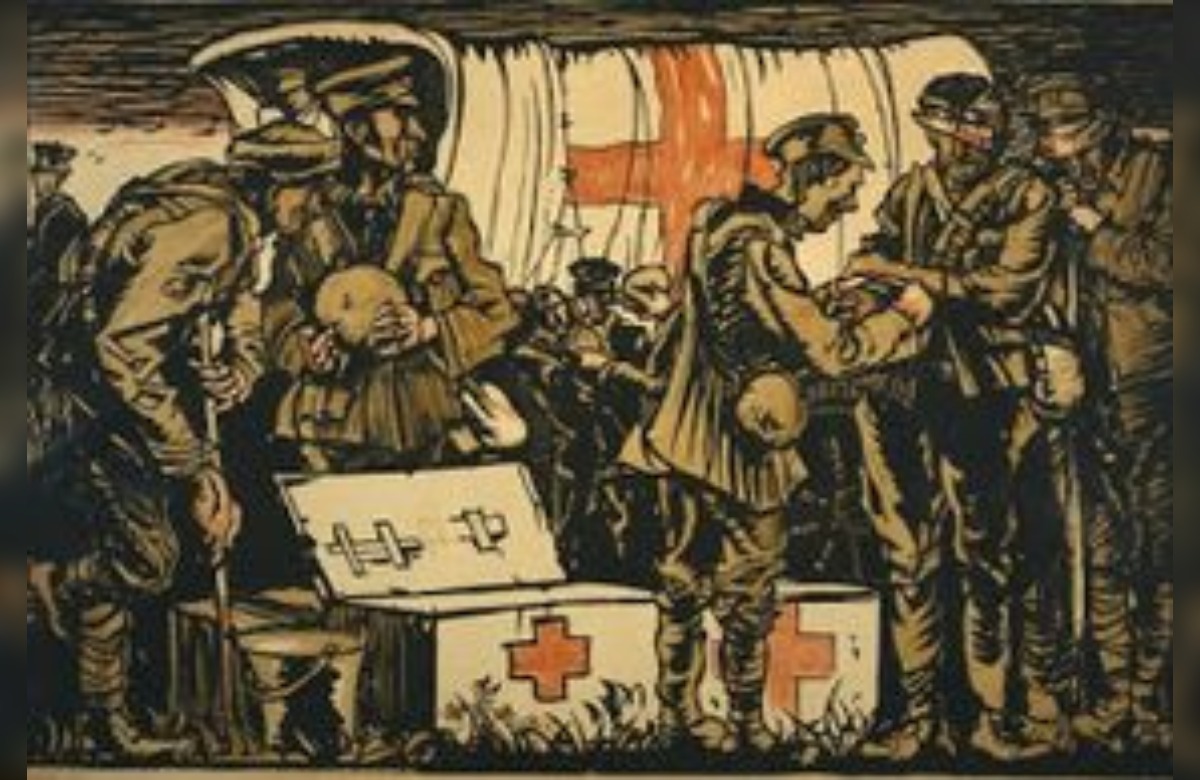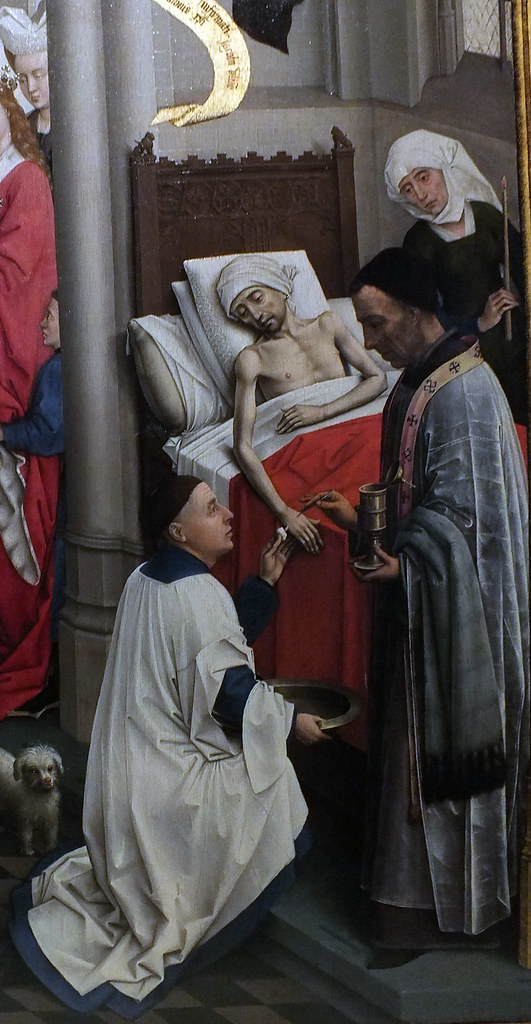
The text explains the functioning of this "hospital", the conditions in which it can operate and the media you can count on.
He begins by evoking war scenarios such as World War I, in which many young men were called to fight in muddy trenches, and committed to fight to conquer yards of territory at great cost. "Seeing mutilations, intoxications, death and destruction, along with a mixture of heroism and despair, they would meet the opposing soldiers and sometimes discover to their amazement that their experiences were identical."
In the midst of that carnage, of horror and chaos, of confusion and bewildering questions - the author points out - was the field hospital. A structure that was maintained as if by a miracle, in impossible conditions and subjected to continuous bombardments. The health personnel, overloaded with work, continuously faced the drama of suffering and death. They had to take quick decisions, concentrating on what they considered to be most importantand were to undertake, with limited resourcespainful surgical interventions.
And here comes the first major characteristic that can be applied to any field hospital: "In the midst of war, which is always an explosion of violence and rage, a field hospital is an oasis of humanity". Also because soldiers from both sides of the conflict are often treated. Those who were engaged in a murderous battle just a short time before, now found themselves as sick people eager for a word of hope.

Part dell Triptych of the Seven Sacraments.Extreme unction is an altarpiece by the Flemish painter Rogier van der Weyden. It is a triptych painted in oil on panel around 1440-1445.
The author is referring more specifically to field hospitals inspired by the Christian faith and even Catholic: "Those who are close to death receive prayerful and sacramental viaticum -Eucharistic communion, which according to the Catholic faith unites the one who receives it with Christ, as the fruit of his passion, death and resurrection, for the final pilgrimage that suddenly becomes his most important journey".
In this perspective he also points out: "In the dehumanization of war, the field hospital is an improvised sign of humanity, of invisible graces, lived in the tumultuous and painful thread of events. It offers not only healing, but also the deepest hope, a hope that has its origin in the sacrifice of Christ.The only school of love that is remembered by the Red Cross that appears everywhere. A sign, indeed, of undoubtedly Christian roots.
He then prolongs the metaphor of war with the current situation. If today the Church can be considered as a field hospital, it is because war continues to exist -a different but no less intense war - and, with it, chaos, suffering and confusion. The enemies are the forces of evil - sin - and the parties in conflict are not well defined, for the attacks come from outside as well as from within individuals. The front lines are blurred, because they pass through the heart of each individual, and there is always the danger of relapsing into pessimism or lack of confidence regarding the victory of good.
What is the role of the Church in this dark situation? The Church is bearer of a light that comes from God. "The Church is the sacrament of salvationa visible sign of invisible graces, capable of healing the deepest wounds ever suffered by men". In this way, "true charity, the divine love poured into the human heart by the Holy Spirit (cf. Rm 5, 5), lived in practice, brings a dose of humanity in an often dehumanized world".
In this field hospital that is the Church, the Church is concerned above all with eternal salvation
In the midst of despair, the Church must be bearer of hope. But it is clear that it is not a hope merely human, but opens minds and hearts "to a perspective that goes beyond the present and its tragedies." Here we can clearly distinguish the hopes (merely) human and that which Benedict XVI has called the "great hope": the love of God who awaits us in order to give us full life, eternal and true life, according to the Christian faith. That great hope that assumes and gives meaning also to the small earthly hopes (cf. enc. Spe salvi, nn. 27 ff).
For this reason," continues the theologian author of the text, "the primary concern of the Church is not only to alleviate current physical ailments," which can also be done by governmental or non-governmental organizations and other private entities with efficient professionalism.
In this field hospital that is the Church, the Church is concerned above all with eternal salvation. Christian and supernatural love of charity, without neglecting the immediate needs - the wounds, the hunger and thirst in the body, in the mind, in the heart -, brings us closer to each one (to our neighbor, who becomes "close") seeing in his needs an occasion that God gives us to take care of him and to attend to him. And at the same time, to bring him closer to the Love of God who is his savior in a much greater sense. In other words, the Christian's love contributes to heal the other who is always called to be a member of the (mystical) Body of Christ. And this concern has an impact on the Christian's daily love for those around him.
So, one might ask, how or where does one distinguish, in this hospital, between what the Church does and what each Christian does personally? We might think that the most important thing is what the Church does as an "institution", officially. But the author does not start there, but rather by valuing what Christians do, and above all what they are, personally.
"The Church is present in the world first of all through the authentic conscience of individual Christians, animated by divine love. Their perception of the challenges is completed by creative virtue. The quality of this response is fundamental, even if it is not measured by human standards. The 'faith that works through charity' (Gal 5:6) manifests the presence and action of the Holy Spirit".
This means - he goes on to explain - that such actions are preceded by an act of faith, centered on Christ, trusting in the power of his divine love". Therefore, the condition is a "living faith which compromises, so to speak, divine intervention, because the Christian believes in the fruitfulness of God's love. And then that loving act - of the Christian who is concerned for the salvation of others and seeks to bring them closer to God and his grace - is strengthened from within by divine grace. Indeed, it could be said that it is God's grace that saves, which counts on our collaboration.
The Christian In this way," the author points out, "he can give a glass of water to the dying soldier, evoking faith in the living God, and this acquires a brilliance and fruitfulness that only the eyes of faith can perceive. This is followed by dramatic encounters with the divine mystery, moments of true charity, reconciliations and requests for forgiveness for mistakes made, turning to God and spiritual expressions of gratitude. All this is - it continues to be everywhere - "the daily bread of Christian field hospitals".
These hospitals are, in effect, Christians who are concerned for the integral good of each and every one of those around themHis children, parents and siblings, his friends and co-workers, all those with whom his life crosses every day.
Put a face to your donation. Help us form diocesan and religious priests.
In this explanation of the role of each Christian as a "doctor", following in the footsteps of Christ, it is interesting to note the author's evaluation of the "media that serve for the proper functioning of this hospital:
"The scarcity of the field hospital's resources indicates spiritual poverty -the Christian virtue of detachment- as a necessary prelude to all truly supernatural acts of love. The painful perception that challenges are insurmountable, that all human argumentation is insufficient, that sins, abuses and dependencies seem irremediable, that wounds and conflicts cannot be healed by natural means such as legal procedures or psychological therapies, is an indispensable prerequisite for the flowering of grace."
This spiritual poverty -observes the theologian- "is a situation in which it becomes evident that the only possible and truly sensible recourse is to seek the intervention of divine power.because human efforts are completely insufficient". It is this a call to continuous prayer, which is the fruit and nourishment of faith, as the principal means for the Christian's action.
Well, this theologian clearly states: are the saints those who appreciate these moments, these situations and these means. "For it is then that they are forced to rely on no one but God and, in doing so, while manifesting faith and charity, they encounter the living God."
In other words also of the author, Christians are called to collaborate in salvation by divine means. Therefore, if they wanted to save the world (and the Church) by natural means alone, their efforts are bound to fail and very soon show their futility.
Consequently, "to recognize that the challenges completely exceed our expectations, means and capacities, and place us in a situation of profound spiritual poverty, is, in fact, a matter of fact, a blessing.". And this is so, because difficulties force to a deepening of faith and to the conviction that poor and apparently useless gestures are nourished from within by the power of divine love.
And hence the conclusion: "The field hospital that is the Church lives in the praisethe admiration and the gratitude towards the God who implores -from us- hearts, human hands and gestures so that a little bit of His divine love to be present here and now".
Mr. Ramiro Pellitero Iglesias
Professor of Pastoral Theology
Faculty of Theology
University of Navarra
Published in "Church and new evangelization".